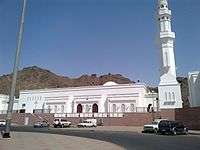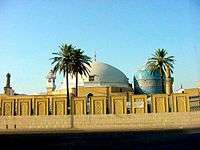Mohammad Hayya Al-Sindhi
| Muhammad Ḥayāt, Al-Sindi | |
|---|---|
| Born |
Muhammad Ḥayāt ibn Ibrahim al-Sindhī Thatta, Sind |
| Died |
1750 Hijaz |
| Era | 18th century |
| Region | present day Saudi Arabia |
| Religion | Islam |
| Denomination | Sunni |
| Jurisprudence | Shafi'i[1] |
| Movement | Sufism |
| Sufi order | Naqshbandi[1] |
|
Influenced
| |
Muhammad Hayyat ibn Ibrahim al-Sindhi (Arabic: محمد حياة بن ابراهيم السندي) (died 3 February 1750) was an Islamic scholar who lived during the period of the Ottoman Empire. He is noted as a teacher of the founder of the Wahhabi Movement, Muhammad ibn Abd al-Wahhab.[1] He belonged to the Naqshbandi order of Sufism.[3][4]
Education and scholarship
Al-Sindhi was born in a village in Sind in present-day Pakistan and traveled locally to get his basic education.[5] Then he migrated to Madinah and studied closely with Ibrahim al-Kurani and his son Muhammaad Tahir al-Kurani.[6] Here, he was initiated into the Naqshbandi tariqa.[5]
Notable students
One of his students was Muhammad ibn Abd al-Wahhab Najdi, whom he met in 1136 Hijri. It was Abdullah ibn Ibrahim ibn Sayf who introduced him to Hayyat al-Sindhi.[5]
Views
Salafi movement |
|---|
 Sab'u Masajid, Saudi Arabia |
|
|
Although trained in Hanafi fiqh, he was also a scholar of the Hanbali school.[5]
Further reading
- Muḥammad Ḥayyā al-Sindī and Muḥammad ibn Abd al-Wahhab: An Analysis of an Intellectual Group in Eightinth-Century Madīna, John Voll. Bulletin of the School of Oriental and African Studies, University of London, Vol. 38, No. 1 (1975), pp. 32–39. Cambridge University Press on behalf of School of Oriental and African Studies. Stable URL: http://www.jstor.org/stable/614196
- 'Allen, Charles (2009-03-01). The Wahhabi Cult and the Hidden Roots of Modern Jihad. Da Capo Press. ISBN 0786733004.
References
- 1 2 3 Allen, Charles (2009-03-01). God's Terrorists: The Wahhabi Cult and the Hidden Roots of Modern Jihad. Da Capo Press. ISBN 0786733004.
- ↑ Haj, Samira (2008-10-02). Reconfiguring Islamic Tradition: Reform, Rationality, and Modernity. Stanford University Press. p. 214. ISBN 9780804769754.
- ↑ John L. Esposito (edited by), The Oxford Dictionary of Islam, Oxford University Press (2004), p. 296
- ↑ Islamic Law and Society. E.J. Brill. 2006-01-01. p. 216.
- 1 2 3 4 Voll, John (1975). "Muḥammad Ḥayyā al-Sindī and Muḥammad ibn 'Abd al-Wahhab: An Analysis of an IntellectualGroup in Eighteenth-Century Madīna". Bulletin of the School of Oriental and African Studies, University of London, Published by the Cambridge University Press on behalf of School of Oriental and African Studies. 38 (1): 32–39. Retrieved 26 April 2015.
- ↑ Robinson, Francis (2001). The 'Ulama of Farangi Mahall and Islamic Culture in South Asia (Illustrated ed.). C. Hurst & Co. Publishers,. ISBN 1850654751. Retrieved 30 April 2015.
